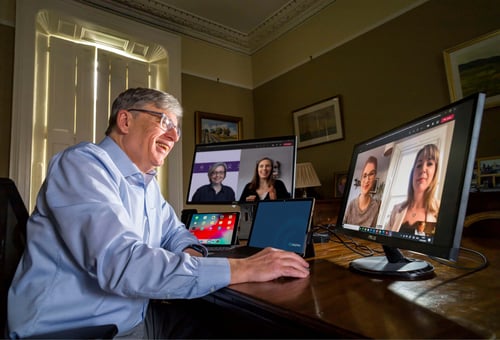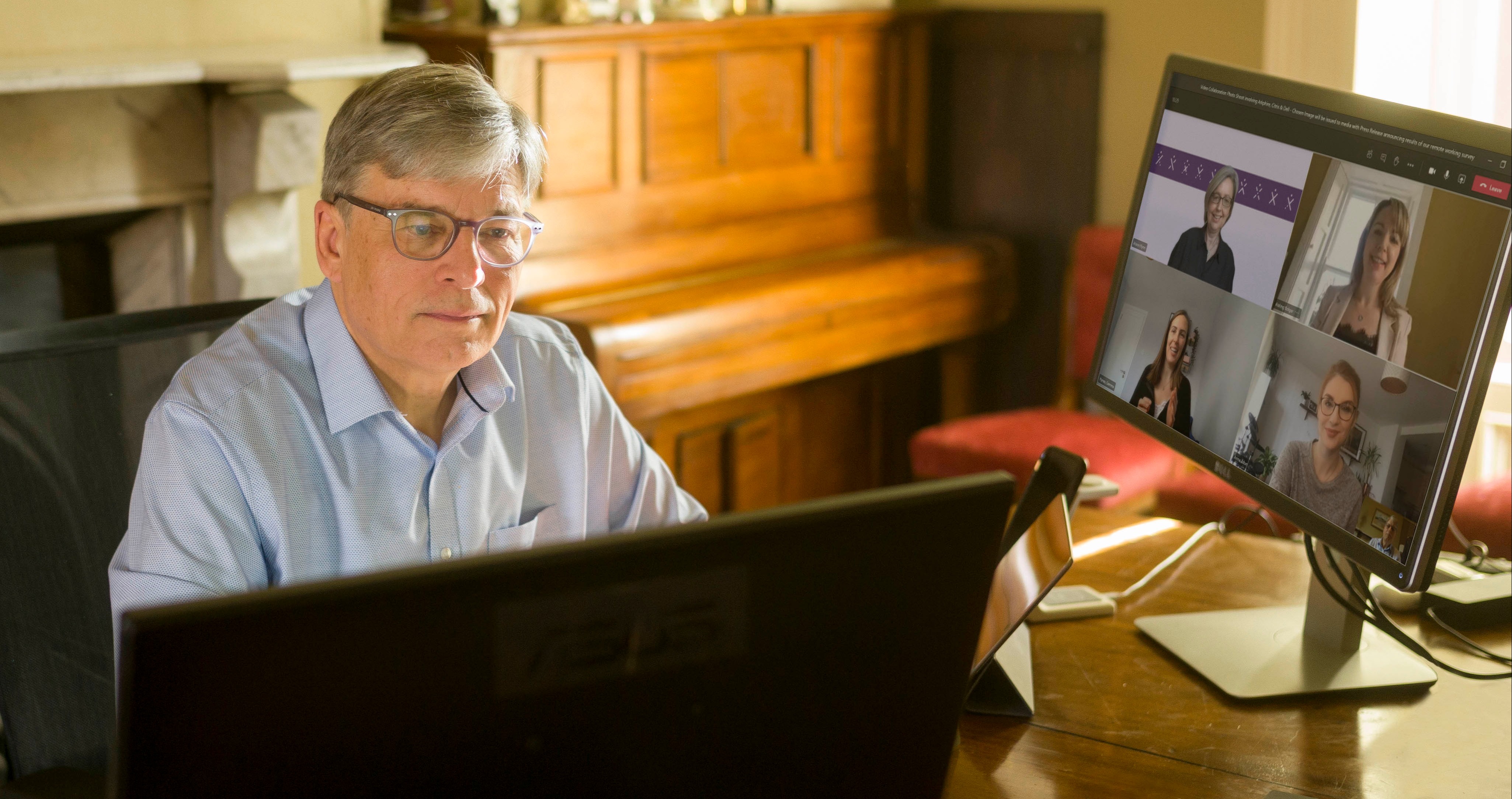54% of directors say camaraderie has improved under remote working arrangements, while only 19% of employees agree.
----
81% of directors believe that employees’ self-discipline has improved, while only 6% feel it has deteriorated.
----
From the employees’ perspective, 46% say their self-discipline has improved compared to 23% who say it has deteriorated while working remotely. Self-discipline issues are more prevalent in companies with more than 100 office workers.
----
31% of staff feel their wellbeing has deteriorated since they started remote working, whereas only 13% of directors feel this is the case for staff.
----
There was some agreement too. 98% of directors trust that their employees are working well remotely and 90% of employees feel trusted.
----
Majority of directors (94%) and employees (80%) feel more confident or as confident in their ability to manage their business and workload respectively.
----
Only 12% of employees and 5% of directors would prefer a full-time return to the office.
Arkphire, the IT product procurement and IT services company, today announces the results of a comprehensive new survey which reveals a significant divergence in the perceived success of remote working between office workers and business leaders. On the whole, senior company directors believe that remote working has had a significantly more positive impact on their businesses than their home-based workforces during COVID. The survey was co-sponsored by Citrix and Dell Technologies.

The announcement follows the recent publication of the Government’s National Remote Work Strategy, geared towards empowering employees who wish to continue working remotely post-pandemic.
The Arkphire survey - which was recently carried out by Censuswide among 200 senior directors and 500 office employees - highlights the prevailing sentiments among remote workers and directors on the perceived successes and challenges associated with the sudden shift towards remote working. The survey highlights widely differing perceptions regarding the impact of remote working on many areas of business management.
Self-discipline while remote working
According to Arkphire’s survey, 81% of directors believe that employees’ self-discipline has improved, while only 6% feel it has deteriorated. Among employees, 46% said that their self-discipline has improved compared to 23% who say it has deteriorated while working remotely. The survey also illustrates how self-discipline issues are more prevalent in companies with more than 100 office workers, with 27% of large company employees saying that their self-discipline has deteriorated as a result of remote working, versus 18% of employees who feel this way in smaller companies.
Camaraderie
The Arkphire survey also highlighted a strong divergence in sentiment between directors and employees when it comes to team camaraderie. 54% of directors say camaraderie has improved, while 16% say it has deteriorated. Contradicting this, only 19% of employees say that camaraderie has improved, while 39% say it has deteriorated during the protracted period of remote working.
Company culture
The results of the survey also identify the differing viewpoints between employees and directors regarding the impact of remote working on company culture. 56% of directors feel their companies are performing better in terms of maintaining a cohesive company culture, compared to 18% who feel that this aspect of their company has deteriorated due to remote working. General office workers think otherwise, with only 23% feeling that their company’s ability to maintain a cohesive culture has improved, versus 28% who feel this has deteriorated in the remote working era.
Time management and delegation
Significant opinion divergences emerged between employees and directors around the perceived effectiveness of time management and delegation. 58% of directors feel that their ability to manage their employees’ time has improved, whereas only 31% of employees feel this is the case. 57% of directors feel that their ability to delegate work has improved in the remote working era, yet only 29% of employees feel this is the case.
Trust and confidence
While Arkphire’s survey showcased the many noteworthy opinion divergences between employees and directors, there were some areas of agreement – particularly in terms of trust and confidence levels. Resoundingly, 98% of directors trust that their employees are working well remotely and 90% of employees feel trusted. An overwhelming 94% of directors feel more confident or as confident in their ability to manage their business while working remotely (86% feel more confident, 8% feel as confident). This heightened sense of confidence is shared among employees, with 80% saying they feel more confident or as confident in their ability to manage their work when working remotely (43% feel more confident, 37% feel as confident).
External job opportunities
Directors expressed concerns around how their employees are spending their time while working remotely. 63% of directors fear that staff may be using their time working remotely to reassess their job prospects and search for new job opportunities. They are right to be concerned as 52% of employees say they are doing so.

Paschal Naylor, CEO, Arkphire discussing the remote working survey results with
(L-R) Alison Flynn, Citrix; Gemma Hynes, Dell Technologies; and Anna Zdun and Aisling Bolger of Arkphire.
Paschal Naylor, Chief Executive of Arkphire said: “We unveiled some very interesting findings that will resonate with business leaders and their employees. It is encouraging to see that the majority of staff feel trusted by their employer to work remotely, and that directors have firm trust in their staff. Since the abrupt shift towards a decentralised workforce, there have been some very important learnings for companies when it comes to effectively managing and supporting remote working. While directors, overall, are pleased with the productivity levels of employees, it’s clear that staff are encountering some difficulties. Business leaders need to reflect on the inherent challenges associated with long-term remote working from an employee’s perspective.
“We have a unique set of actionable data points that clearly show a significant perception chasm between management and staff when it comes to the effectiveness of remote working across numerous strands, particularly around workload management, delegation, performance assessments, and employee onboarding.
“With the Government recently unveiling the National Remote Working Strategy, the future of work looks increasingly decentralised. As such, better work-from-home policies will need to be developed to ensure there is a greater synergy between business leaders and employees, so that remote working works for everyone. This has been a learning curve for everyone, directors included. However, there are a number of practical steps that can be taken to iron out some of the kinks and help create a more seamless and effective remote working landscape for all.
“Prioritising constructive one-to-one sessions with staff, providing regular feedback, arranging outdoor meet-ups and pouring resources into wellbeing initiatives are just some of the ways in which companies can demonstrate their commitment to employee engagement.
“Remote working is now engrained in the fabric of working life. It’s not going away any time soon – our survey findings show that only 12% of employees and 5% of directors actually have a preference for a full-time return to the office. In light of this new reality, we need to inspire employees to excel from anywhere in the world. By effectively using technology to encourage more collaboration, productivity and improved culture, leaders can ensure that their businesses can thrive in the new hybrid working world and employees feel fully supported.”
Additional survey findings have been outlined below, capturing further areas of divergence between directors and employees regarding the perceived effectiveness of remote working.
Additional survey findings
- Almost three times as many employees (31%) feel their wellbeing has deteriorated since they started remote working, whereas only 13% of directors feel their employee wellbeing has deteriorated.
- 59% of directors say that their ability to assess their people’s performance has improved. Conversely, only 22% of employees felt it had improved, with 30% indicating that they felt it had deteriorated.
- Just over a half of directors feel that their ability to onboard and train new employees has improved. Only 17% say it has deteriorated. By contrast, only 20% of employees believe that their onboarding and training has improved, with some 39% saying it has deteriorated.
- 54% of directors say that their company’s management performance has improved, while 15% say it has deteriorated. Their employees were much more ambivalent – 28% say their company’s management performance has improved, while 23% say it has deteriorated.
- 55% of directors say the effectiveness of internal communications has improved, and 16% say it has deteriorated. Employees were evenly split, with 28% saying it has improved and the same saying it has deteriorated.
Survey information
The survey was conducted by Censuswide among 200 business owners and directors with profit and loss responsibility who had office workers in their company pre-pandemic, along with 500 respondents who were office workers before the initial onset of COVID-19 who have since been working remotely in the Republic of Ireland.










